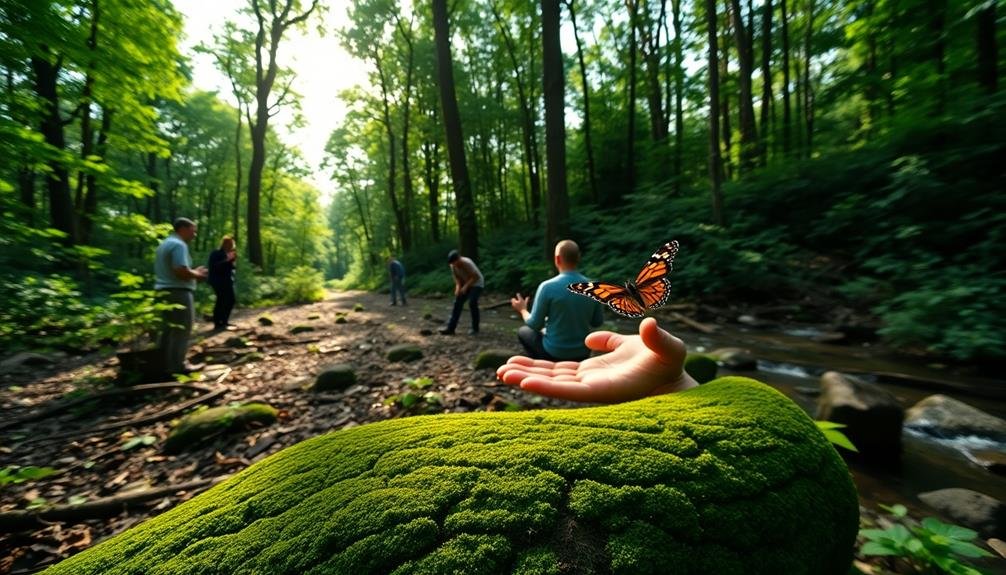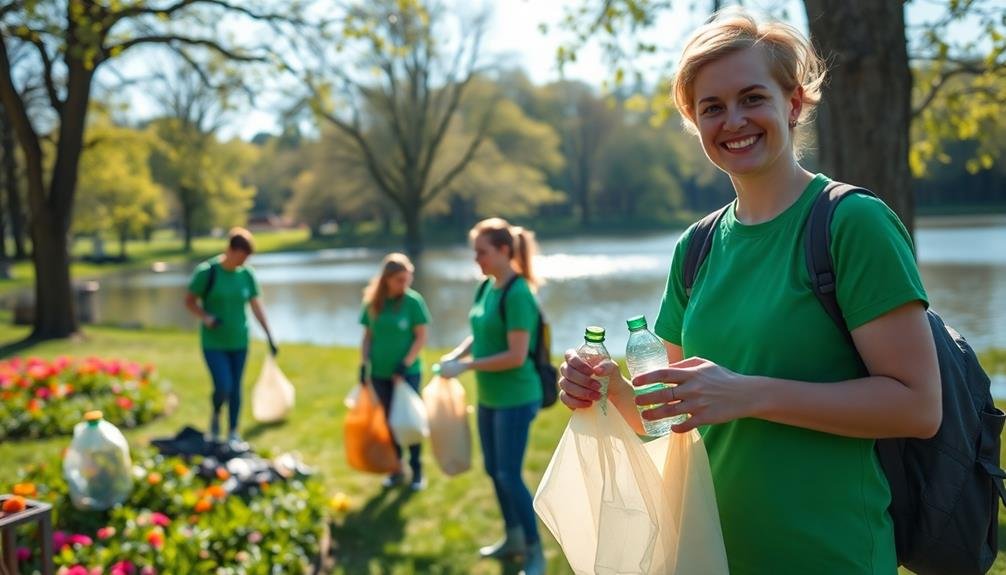Eco-friendly volunteering in nature projects can dramatically reduce your anxiety while making a positive impact on the environment. You'll benefit from ecotherapy, which harnesses nature's healing power to improve mental well-being. Participate in local park cleanups, community garden projects, or wildlife habitat restoration programs to connect with nature and like-minded individuals. Hiking trail maintenance, beach conservation efforts, and urban greening initiatives offer additional opportunities to engage in purposeful outdoor activities. These projects not only provide stress relief and mood enhancement but also foster a sense of community and environmental awareness. Discover how getting your hands dirty can lead to a clearer mind.
Understanding Ecotherapy for Anxiety

In light of the growing mental health crisis, ecotherapy has emerged as a promising approach to managing anxiety. This nature-based therapy harnesses the healing power of the outdoors to improve mental well-being. You'll find that ecotherapy involves various activities, from gardening and hiking to simply spending time in green spaces.
When you engage in ecotherapy, you're tapping into the innate human connection with nature. It's based on the idea that our modern, urban lifestyles have disconnected us from the natural world, contributing to increased stress and anxiety. By reconnecting with nature, you can reduce stress hormones, lower blood pressure, and improve your overall mood.
Ecotherapy isn't just about passive exposure to nature; it often involves active participation in environmental conservation efforts. You might join a community garden, participate in beach cleanups, or help with reforestation projects.
These activities not only benefit the environment but also provide a sense of purpose and accomplishment, which can be particularly beneficial for those struggling with anxiety.
Benefits of Nature-Based Volunteering
Nature-based volunteering offers you a powerful way to improve your mental health while making a tangible difference in the environment.
You'll find opportunities to connect with like-minded individuals, fostering new friendships and a sense of community.
Through hands-on experience, you'll gain a deeper awareness of environmental issues and the impact of your actions on the ecosystem.
Mental Health Improvement
Serenity and calm often accompany nature-based volunteering, but the mental health benefits go far beyond simple relaxation. When you engage in eco-friendly projects, you're not just helping the environment; you're also nurturing your own mental well-being.
Nature-based volunteering can greatly reduce symptoms of anxiety and depression. As you immerse yourself in outdoor activities, your body releases endorphins, the natural mood-boosters that combat stress and promote happiness.
You'll likely experience a decrease in cortisol levels, the hormone associated with stress, leading to improved overall mental health.
These activities also provide a sense of purpose and accomplishment. Whether you're planting trees, cleaning up beaches, or maintaining hiking trails, you'll feel a genuine connection to your community and the natural world.
This connection fosters a sense of belonging and can combat feelings of isolation or loneliness.
Moreover, eco-volunteering often involves physical activity, which is known to improve cognitive function and boost self-esteem.
You'll challenge yourself, learn new skills, and gain confidence in your abilities. The combination of fresh air, physical exertion, and meaningful work creates a powerful formula for mental health improvement.
Social Connection Opportunities
Ever wondered how eco-friendly volunteering can boost your social life? Nature-based projects offer unique opportunities to connect with like-minded individuals who share your passion for the environment. You'll meet people from diverse backgrounds, united by a common goal of making a positive impact on the planet.
These activities foster teamwork and collaboration, helping you build meaningful relationships. You'll work side by side with others, whether you're planting trees, cleaning up beaches, or maintaining hiking trails. These shared experiences create bonds that often extend beyond the volunteer work itself.
Here's a glimpse of the social connections you can make:
| Activity | People You'll Meet | Potential Friendships |
|---|---|---|
| Beach Cleanups | Local surfers, marine biologists | Fellow ocean enthusiasts |
| Urban Gardening | Community members, horticulturists | Neighbors, plant lovers |
| Wildlife Conservation | Biologists, nature photographers | Animal advocates, outdoor adventurers |
Environmental Impact Awareness
Immerse yourself in the world of eco-friendly volunteering, and you'll quickly discover its profound impact on environmental awareness. As you engage in nature-based projects, you'll gain firsthand knowledge of local ecosystems and their challenges. You'll learn about native plant species, wildlife habitats, and the delicate balance that sustains them.
Through hands-on experiences, you'll witness the effects of human activities on the environment. Whether you're cleaning up a polluted beach or restoring a degraded forest, you'll see the direct results of your efforts. This tangible connection to nature fosters a deeper understanding of environmental issues and their solutions.
You'll also become more aware of your own ecological footprint. As you work alongside experts and fellow volunteers, you'll learn about sustainable practices and how to implement them in your daily life. This newfound knowledge will empower you to make more environmentally conscious decisions, from reducing waste to conserving energy.
Moreover, you'll become an ambassador for environmental causes. By sharing your experiences and insights with friends and family, you'll inspire others to take action and contribute to a healthier planet.
Local Park Cleanup Initiatives

Local park cleanup initiatives offer you excellent opportunities to engage with your community while making a tangible difference.
You'll connect with like-minded individuals and foster a sense of shared responsibility for your local environment.
Community Engagement Opportunities
Many communities offer park cleanup initiatives as a way to engage residents in environmental stewardship.
These events provide an excellent opportunity for you to connect with nature, meet like-minded individuals, and make a tangible difference in your local ecosystem. You'll often find these initiatives organized by local government agencies, environmental groups, or community organizations.
To get involved, start by checking your city's website or social media pages for upcoming cleanup events. You can also reach out to local environmental nonprofits or join community forums to stay informed about volunteer opportunities.
When participating in a park cleanup, you'll typically be provided with gloves, trash bags, and tools to help you collect litter and debris.
Here are three benefits of participating in community park cleanups:
- Immediate visual impact on your local environment
- Opportunity to learn about local flora and fauna
- Sense of accomplishment and community pride
Environmental Impact Assessment
While park cleanup initiatives offer immediate benefits, it's important to evaluate their long-term environmental impact. You'll want to take into account both the positive and potentially negative effects of your efforts.
Start by assessing the types of waste you're removing and how their absence affects the local ecosystem. Are you removing invasive species or materials that harm wildlife? That's a clear win. However, be cautious about disturbing natural habitats or removing elements that local fauna might rely on.
Next, examine your cleanup methods. Are you using eco-friendly tools and biodegradable bags? Reflect on the carbon footprint of transporting volunteers and waste. To maximize positive impact, implement a sorting system for recyclables and compostables.
You should also track the quantity and types of waste collected over time to identify trends and target persistent issues.
Don't forget to evaluate the educational impact on volunteers and the community. Are people learning about proper waste disposal and environmental stewardship? This knowledge can lead to long-term behavioral changes that benefit the environment far beyond your initial cleanup efforts.
Community Garden Projects
Community garden projects have become a cornerstone of eco-friendly volunteering efforts worldwide. These initiatives transform vacant lots into thriving green spaces, providing fresh produce and fostering community connections.
You'll find that participating in these projects can notably reduce your anxiety while contributing to environmental sustainability.
When you join a community garden project, you'll engage in various activities that promote mental well-being and ecological awareness. You'll learn about sustainable gardening practices, connect with nature, and build relationships with like-minded individuals.
These gardens often serve as educational hubs, teaching participants about local ecosystems, organic farming techniques, and the importance of biodiversity.
To make the most of your community garden volunteering experience:
- Start small by dedicating a few hours each week to tend to your assigned plot
- Attend workshops and skill-sharing sessions to expand your gardening knowledge
- Participate in community events, such as harvest festivals or seed exchanges
Wildlife Habitat Restoration Programs

How can you make a tangible difference in preserving biodiversity? Wildlife habitat restoration programs offer a hands-on approach to protecting and revitalizing ecosystems. By volunteering for these initiatives, you'll actively contribute to the recovery of degraded habitats and support endangered species.
You'll engage in various tasks, such as removing invasive plants, planting native species, and creating wildlife corridors. These efforts help restore natural balance and provide essential resources for local fauna.
You might also participate in monitoring activities, collecting data on animal populations and habitat health. Many programs focus on specific ecosystems, like wetlands, forests, or coastal areas.
You'll learn about the unique challenges each environment faces and the specialized techniques used to address them. Some projects involve constructing nesting boxes, building erosion control structures, or restoring stream banks.
Hiking Trail Maintenance Opportunities
As hiking trails face increasing wear and tear from growing outdoor enthusiasts, maintenance opportunities have become vital for preserving these natural pathways. You can contribute to these efforts by joining local trail maintenance programs, which often welcome volunteers of all skill levels.
These activities not only help maintain the trails but also provide a therapeutic experience in nature, potentially alleviating anxiety and stress.
When participating in trail maintenance, you'll typically engage in tasks such as:
- Clearing overgrown vegetation and fallen branches
- Repairing erosion damage and improving drainage
- Installing or fixing trail markers and signage
You'll learn valuable skills while working alongside experienced trail stewards, gaining a deeper appreciation for the outdoors.
Many organizations offer regular workdays or multi-day projects, allowing you to choose a commitment level that suits your schedule. By volunteering, you'll play an essential role in ensuring that hiking trails remain safe and accessible for future generations.
Additionally, the physical activity and sense of accomplishment from trail maintenance can boost your mood and overall well-being, making it an excellent eco-friendly volunteering option for those seeking anxiety relief.
Beach and Coastal Conservation Efforts

Beaches and coastal areas around the world are under threat from pollution, erosion, and climate change. You can make a significant impact by volunteering for beach and coastal conservation efforts. These projects not only help protect fragile ecosystems but also provide a calming environment that can alleviate anxiety.
Common activities in coastal conservation include beach cleanups, dune restoration, and marine life monitoring. You'll often work alongside passionate conservationists and like-minded volunteers, fostering a sense of community and shared purpose.
| Activity | Benefits | Skills Gained |
|---|---|---|
| Beach Cleanups | Immediate visible impact | Environmental awareness |
| Dune Restoration | Protects shorelines | Plant identification |
| Marine Life Monitoring | Aids scientific research | Data collection |
To get involved, reach out to local environmental organizations or check online platforms that connect volunteers with conservation projects. Many coastal areas offer regular cleanup events, while others may have ongoing restoration programs you can join. Remember to wear appropriate clothing, bring sunscreen, and stay hydrated. By contributing to these efforts, you're not only helping the environment but also improving your mental well-being through purposeful outdoor activity.
Urban Greening and Tree Planting
Concrete jungles are giving way to urban forests as cities worldwide embrace greening initiatives. You can play a crucial role in this transformation by volunteering for urban greening and tree planting projects.
These efforts not only beautify cityscapes but also combat air pollution, reduce urban heat islands, and provide habitats for wildlife.
To get involved, reach out to local environmental organizations or your city's parks department. They often organize community tree planting events and urban gardening initiatives.
You'll learn proper planting techniques, tree care, and the importance of native species selection.
Here are three ways urban greening can benefit your mental health:
- Physical activity and fresh air reduce stress and anxiety
- Connecting with nature boosts mood and overall well-being
- Sense of accomplishment from contributing to your community's environment
As you volunteer, you'll witness the gradual transformation of barren spaces into lush, green oases.
Your efforts will contribute to cleaner air, increased biodiversity, and a more livable urban environment.
Frequently Asked Questions
How Can I Find Eco-Volunteering Opportunities in My Area?
You can find local eco-volunteering opportunities by checking websites like VolunteerMatch or Idealist. Contact environmental organizations, parks, and conservation groups in your area. Follow their social media, and sign up for newsletters to stay informed about upcoming projects.
Are There Age Restrictions for Participating in Nature-Based Volunteering Projects?
You'll find age restrictions vary by project. Many accept volunteers of all ages, while others have minimum age requirements. Check with specific organizations for their policies. Youth programs often welcome younger participants with parental involvement.
What Skills or Experience Do I Need for Eco-Friendly Volunteering?
You don't need specific skills for eco-friendly volunteering. Most projects welcome beginners and provide training. Your enthusiasm and willingness to learn are key. Bring a positive attitude, basic physical fitness, and a love for nature.
How Much Time Commitment Is Typically Required for These Projects?
You'll find time commitments vary widely for these projects. They can range from one-time events lasting a few hours to ongoing weekly or monthly commitments. It's up to you to choose what fits your schedule and availability.
Can Eco-Volunteering Activities Be Done Individually or Only in Groups?
You can participate in eco-volunteering activities both individually and in groups. Many projects welcome solo volunteers, while others are designed for team efforts. You'll find opportunities that suit your preferences, whether you enjoy working alone or collaborating with others.
In Summary
You've discovered a powerful way to manage anxiety while making a difference. By volunteering for eco-friendly projects, you're not only helping the environment but also improving your mental health. Whether you're cleaning parks, tending community gardens, or restoring wildlife habitats, you're connecting with nature and finding peace. Don't hesitate to get involved in local initiatives. You'll boost your mood, meet like-minded people, and contribute to a greener world. It's a win-win for you and the planet.





Leave a Reply